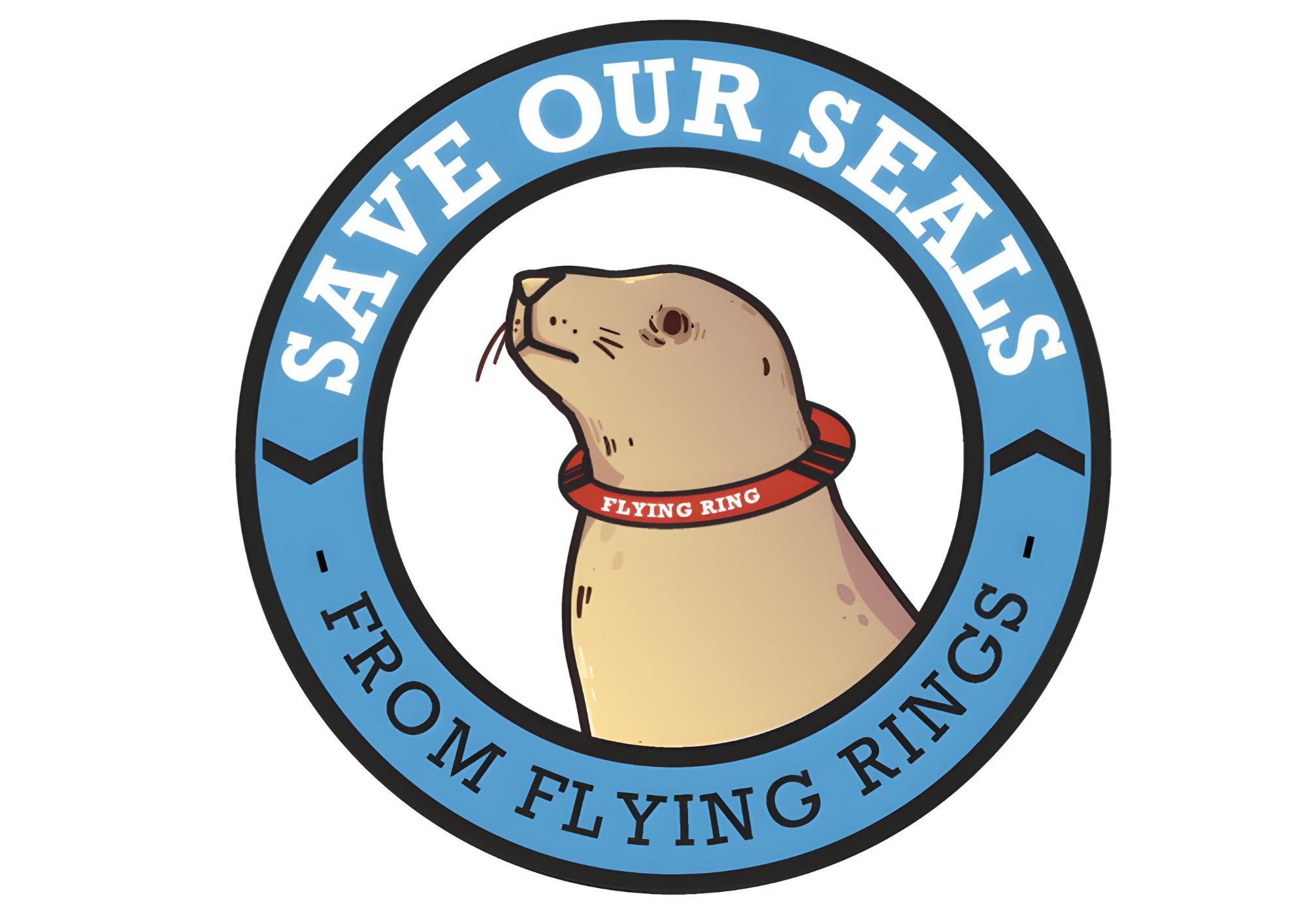Flying Ring Campaign
2025
Supported by the UK Seal Alliance Executive
Why this Campaign?
2025 is an exciting year for the conservation and protection of seals, and we want you to play a big part as we officially launch a really important campaign.
For some time now, the UK has been flooded with imported flying rings.
These items are usually plastic in construction and resemble a ring, often with a strengthening insert. They are purchased in their 1000s from many retail outlets across the country and are used similarly to a solid disc frisbee.
They are cheap to purchase (£1 to £2 on average) and are often lost or discarded on our beaches or near waterways.
Ultimately, they will end up floating in our seas where seals, who have a natural curiosity, will start to investigate and play with them. They are seen as a toy or plaything and this natural curiosity will soon turn into a nightmare when the ring goes over their heads and gets stuck fast.
Despite the efforts of the seal to untangle itself, it will fail. As the seal moves and grows, the ring will soon start to cut into its skin, causing immense suffering and pain.
In time, infection will set in and many will needlessly die.
We recognise that nobody purchases or sells a flying ring with the intention of harming wildlife but the reality is that many are lost or discarded and end up in the sea, posing a danger to seals and other wildlife.
Therefore, immediate action needs to be taken.
The Reality
A seal entrapped by a flying ring is unlikely to be rescued and released from its nightmare.
There are many reasons why an effective rescue cannot be attempted such as the geographical location being unsuitable, the danger to the rescuers or the animal or other animals in the vicinity to name but a few reasons.
There are some rescues that have been successful, but these are rare.
Of those successful seals, depending on injuries sustained, some will require many months of rehabilitation at a specialist Wildlife Centre.
The RSPCA, an animal welfare charity, has estimated the cost of rehabilitating an adult seal entangled by a flying ring as being between £10,000 to £15,000 per animal.
Putting that into context, a flying ring (on average) costs a retailer the wholesale price of 33p to purchase, but it will cost a charity up to 45,455 times more than one flying ring actually costs.
What are we hoping to achieve?
Our overall aim is
To stop the unnecessary harm and suffering inflicted on seals and other marine mammals by entanglement in lost or discarded flying rings.
Our Objectives are to:
Raise public awareness of the harm flying rings cause once lost or discarded around our coast and waterways.
Galvanise all sections of the community, including retailers, to act in a positive and supportive way by not using, purchasing or selling flying rings
Secure government action by gaining sufficient public support by way of a national petition that urges the Government to stop the import and sale of flying rings in the UK.
Urge the Government to encourage retailers to sell biodegradable solid discs as a safer alternative.
Seek public support by asking them to choose to buy a non-plastic (preferably biodegradable) flying disc as a safer alternative.
Gain support amongst local authority councillors across the UK to vote on a voluntary ban on the use, purchase and sale of plastic flying rings within their local authority area.
Where do you fit in?
Achieving success will require a concerted effort across all sections of the community, including retailers, suppliers, organisations (both public and private) and the general public to name but a few.
Gaining public support and traction is paramount, as recently witnessed in the recent broadcasting of a television docudrama on the plight of the Post Office Sub-Postmasters. Although this unfortunate situation was in the public domain for many years, it took a television programme to bring it to the fore, winning over the hearts and minds of the public.
Public feeling is a powerful tool and can bring about change; we want to replicate that success.
Without you, we cannot protect our seals from the harm and suffering they are currently experiencing.
We recognise that nobody purchases or sells a flying ring with the intention of harming wildlife, however the reality is that many are lost or discarded, ending up in the sea and posing a danger to seals.
Campaign Launch
Over the last few months our UK Seal Alliance Flying Ring Strategy Group have worked on what is required to achieve our aims and objectives.
On Monday 26th May 2025 (Spring Bank Holiday) the ‘Save Our Seals from Flying Rings’ Campaign 2025 will be launched.
Jennie Hobson (Chair Flying Ring Strategy Group) said “We are pleased to launch this campaign in an effort to raise awareness and bring about important changes that will ultimately protect our precious seals from harm” she continued “Flying rings pose an unnecessary and avoidable threat to seals. By simply swapping to seal-safe beach toys such as a solid disc frisbee, preferably non-plastic, everyone can help protect our beautiful and iconic seals”
Supported by the UK Seal Alliance Executive, the campaign logo will be displayed on all resources.
The Save Our Seals from Flying Rings campaign petition has been created and accessed via the following link: https://www.change.org/SaveOurSealsFromFlyingRings or by scanning this QR Code:
‘We want you to consider the harm caused and the affect of not doing anything that could make a positive difference’.
Simple Steps to Success
This Campaign is not asking anyone to make significant changes to their lives but merely small changes that will have significant outcomes.
Neither is the campaign out to stop people having fun or make retailers lose out financially.
Quite the opposite, in fact, as there is an immediate solution to the dangers of flying rings...that is to purchase a solid disc frisbee, preferably one made of non-plastic.
Solid disc frisbees have been around since the 1930s and are still readily available in many shops.
We are asking people to only purchase solid disc frisbees and retailers to only sell solid disc frisbees.
The campaign team has created a Guide to Seeking Shop Owners Support that provides advice and guidance to anyone who sees a shop selling flying rings and wants to approach the shop staff to raise awareness about these items.
Major retailers such as Tesco, Pets at Home, Halfords and Sainsburys support the campaign and no longer sell flying rings. Many smaller retailers have also supported us and stopped selling them.
These retailers will be able to show their support by prominently displaying a poster stating ‘We Do Not Sell Flying Rings’
A growing number of local Councils in England and Wales have entered into a voluntary ban on flying rings after constituents have contacted Councillors. This action is a positive step towards galvanising a community against animal suffering.
The campaign team has also created a Guide to Seeking Local Authority Support that provides advice and guidance to anyone wishing to seek the potential of their Council seeking a motion entering into a voluntary ban on flying rings. It also includes a sample PowerPoint presentation to compliment such an approach to their local council.
Posters created for the public and for children are available, together with the main Save Our Seals campaign logo, via our Google Drive: Save Our Seals from Flying Rings
What does success look like?
We are realistic enough to realise that this is not a short term campaign...change takes time but we are confident that collectively we can raise sufficient awareness and support, so that the selling, purchasing or possession of flying rings becomes unacceptable.
It is achievable for the UK to become the first country in the world to become flying ring-free, but it needs us all to make it happen.
Are you willing to help us achieve this?
Should you require further information, please contact Jenny Hobson: jennifer.hobson1@btinternet.com or Gareth Richards: gareth.richards6@virginmedia.com
Thank you.







